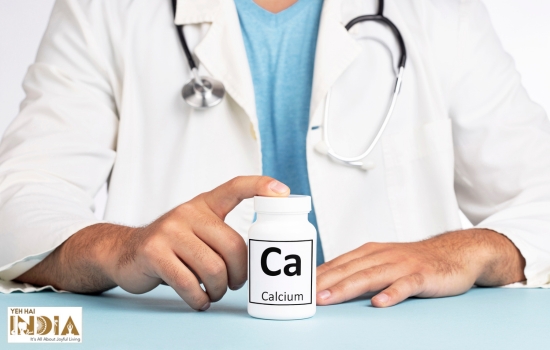Ensuring optimal calcium intake is a paramount concern for maintaining strong bones and overall health. In this article, we have the best calcium supplements in India and the different types available. From traditional formulations to cutting-edge choices, we’ll guide you through the best calcium supplements to support your well-being.
What is Calcium?
Calcium is essential for the formation and maintenance of healthy bones and teeth. It is the most typical mineral in the body of a person, accounting for nearly 99% of total mineral content. The remaining 1% of calcium takes part in a variety of vital biological activities.
Importance of Calcium

1. Bone Health
Calcium is essential for the production as well as the upkeep of healthy bones. It gives bones a structural foundation and aids in their growth and development. Sufficient calcium consumption is especially crucial during infancy and adolescence for reaching maximal bone mass, which can help avoid fractures and developing osteoporosis later in life.
2. Muscular Function
Calcium is essential for muscular contraction and relaxation. There is release of Calcium into cells when a neuron activates a muscle, causing the muscle fibres to contract. This mechanism is vital for appropriate muscular function, which includes coordination, movement, and the maintenance of a healthy heart rhythm.
3. Nerve Transmission
Calcium is important in the flow of nerve impulses across the body. It promotes the expulsion of neurotransmitters, which are necessary for nerve cell communication. This mechanism allows the brain to convey messages to various sections of the body, allowing them to operate properly.
4. Blood Clotting
Calcium is necessary for blood clot formation. Calcium aids in the initiation of the coagulation process by activating clotting factors when there is a break in the blood vessels. This process helps wound healing by preventing excessive bleeding.
5. Calcium Deficiency
Calcium deficiency, also known as hypocalcemia, occurs when the body lacks an adequate amount of calcium to perform its essential functions. Insufficient calcium intake, poor absorption, or excessive loss of calcium through urine or other bodily fluids can contribute to calcium deficiency.
Recommended Article: Calcium and Vitamin D Supplements for Optimal Bone Health
Implications of Calcium Deficiency
- Weakened Bone Structure
- Muscle Dysfunction
- Impaired Nerve Function
- Increased Risk of Hypertension
Need for Calcium Supplements
While it is ideal to obtain calcium from dietary sources, some individuals may have difficulty meeting their daily calcium requirements through food alone. In such cases, calcium supplements can be beneficial. They provide a convenient and reliable way to ensure adequate calcium intake, especially for those who have increased calcium needs or have difficulty consuming calcium-rich foods.
Types of Calcium Supplements
1. Calcium Carbonate
This is a commonly used calcium supplement that provides an essential mineral for the body’s proper functioning.
Calcium Carbonate Advantages
| Prevents Calcium Deficiency | Helps people fulfil their daily calcium demands, Especially if they aren’t getting enough calcium from their diet. Crucial for people who are lactose intolerant, eat a vegetarian or vegan diet, or have diseases that interfere with calcium absorption. |
| Functions as an antacid | Neutralises excess stomach acid, relieves pain & promotes digestive comfort. |
Drawbacks of Calcium Carbonate
| Calcium Retention and Interactions | Exhibits its highest absorption rates within an acidic setting. Individuals who have low levels of stomach acid or those using drugs that limit the production of acid may suffer diminished calcium carbonate absorption. |
| Impairs the absorption of some drugs | Especially, replacement therapy for thyroid hormone and antibiotics. |
2. Calcium Citrate
This is a popular calcium supplement that has a high bioavailability and rate of absorption.
Calcium Citrate Advantages
| Higher Absorption | It can be successfully absorbed even in those who have low stomach acid or are using acid-reducing drugs. A good alternative for persons who have achlorhydria or are using proton pump inhibitors. |
| Prevention of Osteoporosis and Bone Health | Can help minimise the incidence of osteoporosis and preserve bone density, Especially in postmenopausal women and elderly people. |
| Alleviation of Calcium Deficiency | Helps those who don’t get enough calcium from their diet or have circumstances that make calcium absorption difficult. An alternate calcium supply to prevent or treat calcium insufficiency, guaranteeing adequate muscle, neuron, and blood clotting systems function. |
Drawbacks of Calcium Citrate
| Lower Elemental Calcium Content | A greater amount of calcium citrate is necessary to get the equivalent quantity of elemental calcium as other forms of calcium. Individuals with special calcium consumption needs should keep this in mind when selecting a supplement. |
| Higher Cost | Due to its production technique and higher manufacturing expenses. Not cost-effective. |
| Risk of Gastrointestinal Issues | At high dosages, may produce adverse reactions in the digestive tract such as bloating, gas, and constipation. It can be reduced by modifying the dosage or spreading the consumption throughout the day. |
3. Calcium Gluconate
Calcium gluconate is a calcium salt commonly used as a dietary supplement and medication.
This is efficient as a supplement and gives the body the calcium ions it needs for many physiological tasks like muscular contraction, neuronal transmission, and blood coagulation.
Calcium Gluconate Advantages
| Calcium Deficiency Treatment | Often used to treat calcium deficiency, particularly in situations of low calcium levels. Aid in the restoration of calcium levels in those suffering from hypoparathyroidism, kidney failure, or malabsorption diseases. |
| Emergency Medical Applications | Used as a remedy for acute hyperkalemia (excess potassium in the blood). Neutralise the cardiotoxic effects of some drugs, such as calcium channel blockers. |
Drawbacks of Calcium Gluconate
| Poor Absorption | Not as easily absorbed by the body as other calcium supplements. Its absorption is affected by several variables, including stomach the pH level, vitamin D status, and the existence of other chemicals in the gastrointestinal system. Higher dosages or special delivery strategies may be required for adequate absorption. |
| A lower proportion of elemental Calcium | Indicates the need for a greater amount of calcium gluconate to generate an equal quantity of elemental calcium as other forms of calcium, such as calcium carbonate. This must be taken into account while establishing the proper dose. |
| Potential Side Effects | While generally well-tolerated, calcium gluconate may cause side effects such as gastrointestinal discomfort, including constipation and bloating. Additionally, in rare cases, allergic reactions may occur. |
4. Calcium Lactate
Calcium lactate is a calcium salt derived from lactic acid. It is often used as a food additive and a dietary supplement.
It is a fantastic source of calcium from food. Calcium is a mineral crucial for bone and tooth health, as well as supporting different physiological activities such as muscular contraction and transmission of nerves.
Calcium Lactate Advantages
| Improved Absorption | It has better bioavailability. More quickly absorbed by the body, ensuring that calcium is delivered to the tissues and cells that require it for proper functioning. |
| Acid-Neutralizing characteristics | Useful for people who suffer from acid reflux or heartburn. Can help relieve symptoms by neutralising excess stomach acid when taken. |
Drawbacks of Calcium Lactate
Calcium lactate, like other calcium salts, has a lower proportion of elemental calcium.
Low Calcium Concentration People with severe calcium deficiency may require greater doses of calcium lactate or alternate calcium supplements to achieve their RDA. Potential Gastrointestinal Adverse Effects May cause gastrointestinal adverse effects like bloating, constipation, and gas.
These adverse effects are usually minor and can be avoided by changing the amount taken or consuming the supplement with food.
Recommended Article: Evaluating Supplement Claims and Selecting Safe Products: A Detailed Guide
Excess calcium consumption in any form can lead to elevated blood calcium levels, a disorder characterised by hypercalcemia. Prolonged hypercalcemia can result in kidney stones, reduced kidney function, and other health problems.
Practical Tips for Choosing Calcium Supplements
| Consider your individual needs | Are there any other nutrients you need to supplement your diet with? |
| Quality of the supplement | High-quality ingredients and third-party tested for purity. |
| Consider the dosage | Keep in mind medical conditions, which may influence the need for more or less calcium. Most adults need 1000 mg of calcium daily. |
| Form of calcium | Multiple forms are available, choose as per your individual need as each form has its advantages and disadvantages. |
| Read label carefully | Carefully evaluate the dose, ingredients involved and any kind of warnings for allergens. |
Additionally, consider cost, convenience, and taste.
Not every calcium supplement comes solely with calcium as its main ingredient. A variety of other minerals or vitamins are usually present. When selecting supplements, it is important to not be swept away by advertisements and promotions.
Make sure to read the label and understand the combination of salts present in the product.
Take advice from doctors and nutritionists before finalising what is more suitable for your individual needs.
The Pradhan Mantri Bhartiya Janaushadhi Pariyojana (PMBJP), popularly known as Pradhan Mantri Jan Aushadhi Yojana, provides minerals and vitamin supplements at a subsidized rate in government stores.
The government of India brought this scheme into implementation in 2014, intending to make essential medicines available at affordable prices to the masses.
Along with vitamin and mineral supplements, a wide of medicines are available at government-run medical stores (Janaushadhi Kendras). You can buy them directly from the PMBJP website.
Premium quality products manufactured by reputed pharmaceutical companies can be purchased at up to 80% discounted prices.
Sources:
- Academy of Nutrition and Dietetics
- National Institutes of Health (NIH) – Office of Dietary Supplements
- Drugs.com – Calcium Gluconate
- American Academy of Orthopaedic Surgeons (AAOS)
- Indian Council of Medical Research (ICMR)
- National Institute of Nutrition (NIN)
- MedlinePlus – U.S. National Library of Medicine
- Nutrients – Calcium Bioavailability and Its Relation to Osteoporosis: A Review
- National Osteoporosis Foundation
Also, Read: Calcium Supplements Explained: The Scientific Basis for Bone Health










